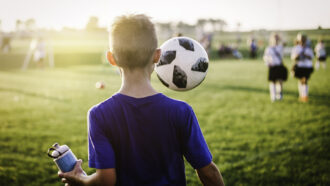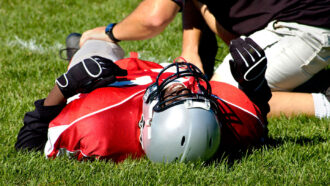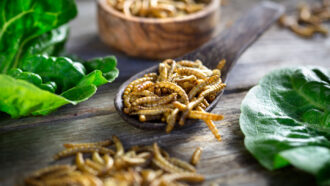MS-LS1-8
Gather and synthesize information that sensory receptors respond to stimuli by sending messages to the brain for immediate behavior or storage as memories.
-
 Health & Medicine
Health & MedicineHow to be heat-safe when playing sports
Protecting young athletes from overheating is getting more important as climate change turns up the temperature.
By Megan Sever -

-
 Health & Medicine
Health & MedicineNew brain scans may show if a concussion has not yet healed
Concussions change certain brain waves, and delta waves may be the best signs of when teens can return to competitive sports.
-
 Computing
ComputingSleep helps AI models learn new things without forgetting old ones
Breaks in training meant to mimic human sleep helped artificial intelligence learn multiple tasks.
-
 Humans
HumansWhen it comes to dance, it’s all about the bass
During a concert, people danced more when they were bathed in sounds that were too low for their ears to hear.
-
 Brain
BrainSome screen time may aid kids’ recovery from concussions
A few hours a day on digital devices may actually aid recovery by connecting kids with friends and giving their brains some stimulation.
-
 Brain
BrainLet’s learn about creativity
By reading brain scans and eavesdropping on brainwaves, scientists are learning more about how creativity works.
-
 Humans
HumansLong-lost ‘smellscapes’ are wafting from artifacts and old texts
By studying and reviving old scents, archaeologists are finding new clues about how ancient Egyptians experienced their world through smell.
By Bruce Bower -
 Chemistry
ChemistryNew meat-scented food flavoring comes from sugar — and mealworms
Insects could become a protein-rich part of the human diet. This new research aims to help people get past the ick of eating insects.
By Anil Oza -
 Brain
BrainWarning! Nicotine poses special risks to teens
Even a single dose of nicotine during early teen years can start a life-long cycle of nicotine use and addiction.
-
 Psychology
PsychologyLying won’t stretch your nose, but it will steal some brainpower
The science of lying shows that most people don’t lie often. But when they do, it takes a surprising toll on their brains.
-
 Psychology
PsychologyAddiction can develop when reward-seeking changes a teen’s brain
Over time, the pleasure disappears and craving grows. That craving causes stress that can drive people to use drugs or pursue unhealthy behaviors again and again.